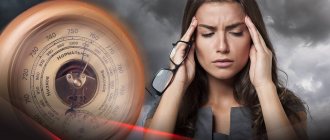Publication date: August 21, 2020
Sometimes, when you have to change your body position, darkening occurs in your eyes. And this is usually associated with various pathologies. Although this phenomenon is not always a danger signal. The eyes also become dark in a healthy person when there is overwork caused by heavy physical exertion or a stressful condition. Often the symptom of darkening in the eyes occurs when standing up. It may recur regularly or may be a one-time occurrence. Darkening in the eyes that appears sporadically does not indicate visual impairment. This is only a short-term deterioration in the perception of the environment. And the exact cause of darkening in the eyes can be determined by a doctor at a medical center by conducting diagnostic examinations.
Blood pressure problems
Dizziness, quite severe, often occurs in people with low blood pressure. Their blood pressure sometimes drops below 100/60 mmHg. And it leads to severe discomfort in the body: tinnitus, dark spots in the eyes and severe headaches. This condition often leads to fainting. Low blood pressure is often observed in pregnant women and teenage children. Therefore, if a person is aware of his low blood pressure, then he does not need to make sudden movements.
If you feel dizzy often
Benign paroxysmal positional vertigo (BPPV, otolithiasis)
With BPPV, attacks of dizziness last a few seconds, less often minutes, and sometimes nausea occurs. This usually happens when a person lies down and then gets up, or if he throws his head back. The reason for this condition is that in the labyrinth - an important part of the vestibular apparatus - calcium carbonate crystals appear, which move, irritate the receptors, and the brain ultimately receives conflicting signals. To confirm this diagnosis, the doctor, after talking with the patient, performs a Dix-Halpike test.
BPPV is treated with a repositioning maneuver in the Brandt-Daroff, Semont, or Epley space. In most cases, there is little point in using special medications to treat dizziness - this is done only if the attacks are very frequent.
Vestibular neuronitis
Vestibular neuronitis begins abruptly, a person constantly feels dizzy, feels nauseated, vomits, and finds it difficult to walk. The doctor may also notice spontaneous vestibular nystagmus, and a positive horizontal head thrust test will indicate this disease.
The hearing is preserved (if not, then we are talking about another disease - labyrinthitis). Why do these symptoms occur? Vestibular neuronitis is a viral or bacterial inflammation of the vestibular ganglion, that is, the nerve ganglion in the internal auditory canal. There are very few effective antiviral drugs, and all of them are aimed at combating specific viruses. And since it is impossible to understand what exactly caused vestibular neuronitis, we can only wait: the worst period lasts no more than 1–2 days. The healing process can only be accelerated with the help of steroidal anti-inflammatory drugs.
Meniere's disease
With Meniere's disease, repeated attacks of severe dizziness last for minutes or even hours, on one side there is noise and pressure in the ear; Nystagmus, nausea, vomiting occurs, and he loses his balance. During audiometry (test of hearing acuity), the doctor will detect hearing impairment at low frequencies. This disease may take months or years to appear. It occurs due to increased pressure of endolymph (fluid) in the inner ear, which disrupts its function. If the diagnosis is confirmed, the doctor may prescribe diuretics (diuretics - hydrochlorothiazide, acetazolamide) and a low-salt diet. If the attacks significantly reduce your quality of life, your doctor will also prescribe antiemetics (domperidone, metoclopramide), benzodiazepines (diazepam, lorazepam), or antihistamines (dimenhydrinate, diphenhydramine).
Hunt syndrome
Acute dizziness and/or hearing loss, unilateral paralysis of the facial muscles, ear pain, rashes in the ear canal and auricle - this is how Hunt's syndrome manifests itself, damage to the geniculate ganglion (part of the facial nerve) by herpes zoster virus. Treatment uses a specific antiviral drug, acyclovir, and corticosteroids.
Maze Shaking
If the labyrinth was damaged during a head injury, this will manifest itself as dizziness, nausea, vomiting and an inability to maintain balance. Gradually, over days or months, this condition passes. However, benign paroxysmal positional vertigo or, in rare cases, Meniere's disease may then occur.
Migraine vertigo (vestibular migraine)
Typically, migraine vertigo attacks last minutes or hours. In this case, in addition, visual disturbances typical of a migraine aura often occur (flashes, dots, rainbow stripes flashing before the eyes, narrowing of the visual fields, etc.), fear of light and sound. However, headaches do not always occur. A person may notice that such a condition is provoked, like a regular migraine, by certain foods, smells, situations, etc. In this case, a neurologist can prescribe drugs for prevention: triptans or tricyclic antidepressants in small doses, antiepileptic drugs, beta blockers. There are also special exercises for vestibular rehabilitation.
Dizziness with multiple sclerosis
With multiple sclerosis, the membranes of nerve fibers are affected in humans, and this causes various disorders, mainly motor ones. However, in 20 percent of cases, this disease manifests itself as attacks of dizziness, and resembles vestibular neuronitis. However, the symptoms last longer - several days or weeks. The doctor may prescribe a short course of corticosteroids to help the patient feel better.
Transient ischemic attack (TIA)
This condition is very similar to a stroke, but it resolves on its own and does not damage brain tissue. In addition to dizziness and loss of balance, a person may experience numbness on one side of the body, weakness, speech may be slurred, confusion may occur, double vision or loss of vision, memory loss, difficulty swallowing, and urinary or fecal incontinence. All this happens due to the fact that a thrombus or embolus (a particle of a blood clot, atherosclerotic plaque, altered heart valve) clogs a brain vessel for several minutes or hours. Since patients with TIA have an increased risk of stroke, if these symptoms occur, be sure to consult a doctor as soon as possible.
Perilymphatic fistula
Perilymphatic fistula occurs after traumatic brain injury, barotrauma (damage due to a sharp change in atmospheric pressure) or heavy load. It manifests itself as dizziness and/or hearing loss after sneezing, heavy lifting, straining, coughing and loud noises. This happens due to damage to the membranes in the middle and inner ear. It is quite difficult to diagnose this condition; for this, the doctor prescribes a computed tomography scan. In some cases, a perilymphatic fistula goes away on its own, but to speed up the process, you need to stay in bed, lie on the bed with the head of the bed raised, and avoid straining. However, if there is no effect after a few weeks, you should resort to other methods of treatment, possibly requiring surgery.
Semicircular canal dehiscence syndrome (Minor's syndrome)
Dizziness with Minor syndrome is provoked by coughing, sneezing, loud sounds, and the Valsalva maneuver. Nausea or instability may also occur during short episodes of dizziness. In some patients, hearing deteriorates (this is manifested on the audiogram as an air-bone interval). In this disease, the bone covering the superior semicircular canal becomes thin or even disappears, causing symptoms. It should be said, however, that this syndrome is extremely rare.
Cogan syndrome
This rare autoimmune disease manifests itself as interstitial keratitis, that is, clouding in the middle and deep layers of the outer layer of the eyeball - the cornea. The disease is also expressed in attacks similar to those of Meniere's disease (dizziness, nausea, vomiting, noise and ringing in the ears, hearing loss, loss of balance). An illusion of vibration of surrounding objects (oscillopsia) may occur. Steroids and other immunosuppressants are prescribed for this disease.
Rotational occlusion of the vertebral artery (archer syndrome)
With this rare disease, dizziness appears when a person turns his head in one direction (less often in both): the vertebral artery is compressed, which leads to this condition. Perhaps the reason for this is a degenerative disease of the spine or congenital foraminal stenosis (narrowing of the intervertebral foramen). Treatment options for the disease range from gentle treatment to conservative and even surgical intervention.
Wallenberg syndrome
Sudden dizziness and imbalance are symptoms of Wallenberg syndrome. Double vision, weakness in one hand, constriction of the pupil, and impaired temperature and pain sensitivity on one side may also occur. All this occurs due to blockage of the posterior inferior cerebellar or vertebral artery, as well as traumatic dissection of the vertebral artery. Treatment in this case is symptomatic.
Cerebellar stroke
With a stroke of the cerebellum (the part of the brain responsible for coordinating movements and maintaining balance), sudden dizziness occurs with nausea and vomiting, nystagmus, impaired movement of the limbs, and the person falls to one side. This usually happens to people over 60 and those at increased risk of stroke (people with diabetes or hypertension). To confirm the diagnosis, the doctor will urgently perform a computed tomography or magnetic resonance imaging scan.
Episodic ataxia type 2
This genetic disease manifests itself in childhood and adolescence: the child experiences severe dizziness, movement disorders, nausea, and vomiting. Attacks can last from several hours to several days. To treat an acute condition, your doctor will prescribe acetazolamide.
TREATMENT OF SYSTEMIC VERTIGO
If vertigo lasts more than a few hours or days, a person's quality of life can be severely affected. Therefore, the doctor prescribes medications that reduce symptoms. First of all, antihistamines are used (dimenhydrinate, diphenhydramine), as well as drugs that in addition have a sedative effect - antiemetics (domperidone, promethazine, metoclopramide, ondansetron) and benzodiazepines (diazepam, lorazepam, clonazepam, alprazolam).
Rehabilitation can also be effective - special exercises that will help cope with problems of the vestibular system. The most useful thing is not to delay the start of classes.
Vegetative-vascular dystonia
This disease often occurs in adolescents. It is associated with insufficient maturity of the endocrine and nervous systems. Manifest in one-time attacks or have a chronic course.
The resulting darkness in the eyes is characteristic of hypotensive dystonia. During the next attack, a person’s pulse quickens and his vision darkens. Such patients complain that the chest is heavy, there is not enough air, and there is weakness with headache. Symptoms of vegetative-vascular dystonia include cold extremities and frequent fainting.
Dystonia is caused by exhausting physical activity, vitamin deficiencies, and poor nutrition among middle-aged people.
Treatment and prevention methods
If, upon getting out of bed, a person experiences frequent bouts of dizziness, a doctor’s consultation is indicated. It is possible to objectively distinguish the course of pathological processes in the body from true vertigo only through a set of laboratory tests. For this purpose, the following procedures are prescribed:
- blood and urine tests;
- X-ray of the cervical spine;
- MRI of the brain;
- Ultrasound of the abdominal cavity and other internal organs.
The further treatment regimen is determined based on the results of the study, examination and collection of medical history.
Prevention of dizziness involves following the recommendations of the attending physician and carrying out simple actions:
- observe the rules of work and rest;
- eat well;
- do not stay in forced positions for a long time that interfere with blood circulation;
- avoid sudden movements when getting out of bed in the morning and throughout the day;
- When playing sports, physical activity is normalized.
It is important to monitor your health, do not panic if mild vertigo is present, but seek medical help in time as needed.







